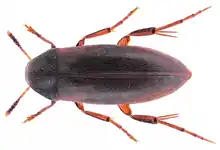| Melandryidae Temporal range: | |
|---|---|
 | |
| Orchesia minor | |
| Scientific classification | |
| Domain: | Eukaryota |
| Kingdom: | Animalia |
| Phylum: | Arthropoda |
| Class: | Insecta |
| Order: | Coleoptera |
| Suborder: | Polyphaga |
| Infraorder: | Cucujiformia |
| Superfamily: | Tenebrionoidea |
| Family: | Melandryidae Leach, 1815 [1] |
.png.webp)
Zilora
Melandryidae is a family of beetles in the superfamily Tenebrionoidea. Members of the family are found worldwide, with around 420 species in 60 genera. Larvae and adults are generally associated with rotting wood and wood-decomposing fungi.[2]
Genera
These 44 genera belong to the family Melandryidae:[3][4][5][6][7]
- Abdera Stephens, 1832 g b
- Abderina Seidlitz, 1898 g
- Amblyctis Leconte, 1879 g b
- Anisoxya Mulsant, 1856 g b
- Archaeoxylita Nikitskij, 1977 g
- Archaeserropalpus Nikitsky, 2002 g
- Argyrabdera Sahlberg, 1913 g
- Cicindelopsis Cockerell, 1920 g
- Conopalpus Gyllenhal, 1810 g
- Cuphosis Champion, 1889 g
- Dicraeomorpha g
- Dircaea Fabricius, 1798 g b
- Dircaeomorpha Fairmaire, 1896 g
- Dolotarsus Jacquelin du Val, 1863 g b
- Electroabdera Alekseev, 2014 g
- Emmesa Newman, 1838 i c g b
- Enchodes Leconte, 1866 g b
- Eucinetomorphus Perris, 1875 g
- Hypulus Paykull, 1798 g b
- Lederia Reitter, 1880 g b
- Marolia Mulsant, 1856 g
- Mecorchesia Broun, 1914 g
- Melandrya Fabricius, 1801 g b
- Microscapha LeConte, 1866 g b
- Microtonus LeConte, 1862 g b
- Neogonus Hampe, 1873 g
- Nipponomarolia Miyatake, 1982 g
- Orchesia Latreille, 1807 g b
- Osphya Illiger, 1807 g b
- Phloeotrinus Nikitsky, 1989 g
- Phloiotrya Stephens, 1832 g b
- Phryganophilus C.R.Sahlberg, 1834 g b
- Prothalpia LeConte, 1862 i c g b
- Pseudocuphosis Nikitsky, 2002 g
- Pseudohallomenus Nikitskii, 1977 g
- Rushia Forel, 1893 g b
- Scotochroa Leconte, 1874 g b
- Scotochroides Mank, 1939 g
- Serropalpus Hellenius, 1786 g b
- Spilotus LeConte, 1862 g b
- Symphora Leconte, 1866 g b
- Xylita Paykull, 1798 g b
- Zilora Mulsant, 1856 g b
- Zilorini g
Data sources: i = ITIS,[3] c = Catalogue of Life,[4] g = GBIF,[5] b = Bugguide.net[6]
The oldest fossils of the family are known from mid-Cretaceous (Albian-Cenomanian) Burmese amber of Myanmar.[8]
References
- ↑ "Melandryidae". Integrated Taxonomic Information System.
- ↑ Nikitsky, Nikolai B. and Pollock, Darren A.. "11.6. Melandryidae Leach, 1815". Volume 2 Morphology and Systematics (Elateroidea, Bostrichiformia, Cucujiformia partim), edited by Willy Kükenthal, Richard A.B. Leschen, Rolf G. Beutel and John F. Lawrence, Berlin, New York: De Gruyter, 2010, pp. 520-533.
- 1 2 "Melandryidae Report". Integrated Taxonomic Information System. Retrieved 2018-04-29.
- 1 2 "Browse Melandryidae". Catalogue of Life. Retrieved 2018-04-29.
- 1 2 "Melandryidae". GBIF. Retrieved 2018-04-29.
- 1 2 "Melandryidae Family Information". BugGuide.net. Retrieved 2018-04-29.
- ↑ http://nomen.at/Tenebrionoidea nomen.at, Tenebrionoidea
- ↑ Tihelka, Erik; Huang, Diying; Cai, Chenyang (2020-01-02). "First false darkling beetle from mid-Cretaceous Burmese amber (Coleoptera: Melandryidae)". Alcheringa: An Australasian Journal of Palaeontology. 44 (1): 169–175. doi:10.1080/03115518.2019.1664635. ISSN 0311-5518. S2CID 210288332.
External links
This article is issued from Wikipedia. The text is licensed under Creative Commons - Attribution - Sharealike. Additional terms may apply for the media files.